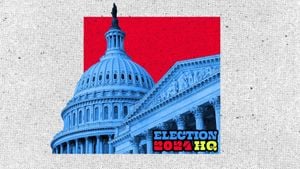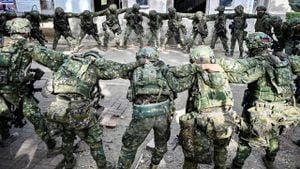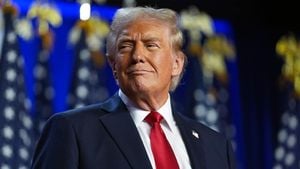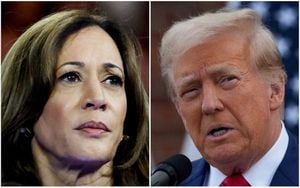Former Prime Minister Imran Khan stands at the center of Pakistan's tumultuous political arena as his party, Pakistan Tehreek-e-Insaf (PTI), prepares for what it calls a "long march" to Islamabad, scheduled for November 24. This significant mobilization is fueled by allegations of electoral fraud related to the upcoming general elections on February 8 and demands for the release of political prisoners. Khan, who has been behind bars since August 2023 on multiple charges, asserts these actions are nothing but politically motivated maneuvers aimed at keeping him from reclaiming his position.
According to Khan's party, the primary demands of the protest include the reversal of questionable constitutional amendments—namely the 26th amendment—intended, they argue, to undermine the judiciary's independence. Joining the chorus of protests, Khan's sister, Aleema Khan, appealed to supporters, emphasizing the choice between "martial law" and "freedom," signaling the high stakes of this movement.
It is no secret the political climate is fraught with tension. The current government, led by Prime Minister Shehbaz Sharif and supported by the military—a powerful institution typically seen as the puppet master of Pakistan's politics—has vehemently denied allegations of unfair treatment toward Khan and claims of rigging. The government's refusal to admit to any electoral malfeasance has only intensified PTI's grievance narrative, leaving supporters questioning the legitimacy of the upcoming elections.
While Khan's leadership committee has been formed to steer these protests and negotiate with the government, uncertainty looms over whom they truly have the authority to negotiate with. Khan has previously pointed fingers at the military establishment, accusing them of being the "real decision-makers" behind the civilian government. This suggests a complex web of power dynamics at play, where military influence remains deeply entrenched.
The judicial situation surrounding Khan is equally precarious. Just recently, Pakistan's courts dismissed Khan's request for acquittal on charges related to expensive gifts unlawfully acquired from the state repository, commonly referred to as the Toshakhana case. This latest ruling sees Khan and his wife facing serious accusations of acquiring luxury gifts, including jewelry worth over €380,000, leading to claims they undervalued and misappropriated these items.
Even as he fights these legal battles, Khan objects to all charges, dubbing them part of a broader strategy to eliminate him from the political equation. Alongside the Toshakhana case, he faces repercussions for the protests triggered by his brief arrest back in May, when PTI supporters allegedly stormed government and military facilities.
Recent developments have sparked speculation about government intent. While officials maintain the amendments are aimed at clearing judicial backlogs, Khan and his supporters remain unconvinced, arguing this restructuring is merely another layer of oppression aimed to silence dissent.
Across Pakistan, public sentiment is increasingly polarized. Supporters of Khan rally behind him, viewing him as the legitimate leader unjustly removed from power, whereas opponents accuse him of stoking unrest for his benefits, fueling discord among the populace. It is within this hostile environment of conflicting narratives and heightened emotions where the upcoming protests are set to take place.
The authorities have already ramped up measures, likely anticipating significant turnouts for these marches. There is apprehension on both sides of the political divide. Some criticize the government for its heavy-handed response to demonstrations, warning such actions might backfire and escalate tensions rather than quell the unrest.
Notably, the judiciary's role during this seemingly unending saga cannot be overstated. Critics claim the judicial system has been compromised, acting as an instrument of the ruling party to silence opposition voices. Meanwhile, supporters of Khan see his fight as emblematic of broader struggles for justice and democracy within Pakistan.
Meanwhile, incidents of violence have been reported across various regions. Just last week, two children were killed when a powerful explosion occurred at their house rooted deep within the territory formerly held by the Pakistani Taliban. This incident, among others, reminds Pakistanis of the perils lurking within the country's security dynamics, posing another layer of complexity to the prevailing unrest.
For many, the stakes have never seemed higher. Those within Khan's camp are preparing to take to the streets, emboldened by the fervent belief they must reclaim Pakistan's political narrative. The atmosphere remains charged with uncertainty, but one thing is clear: the march scheduled for November 24 could very well define the next chapter of Pakistan’s political drama.



